人教版(2019)必修第一册Unit 5 Languages around the world Language points课件(共58页)
文档属性
| 名称 | 人教版(2019)必修第一册Unit 5 Languages around the world Language points课件(共58页) | 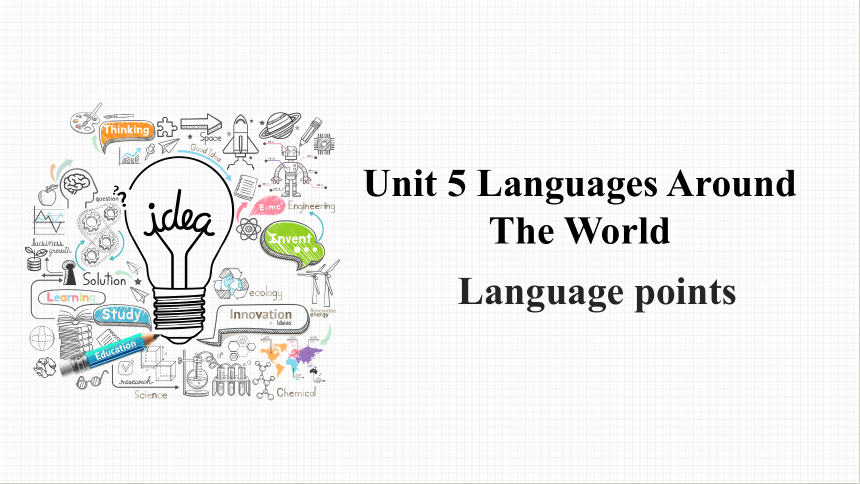 | |
| 格式 | pptx | ||
| 文件大小 | 1.7MB | ||
| 资源类型 | 教案 | ||
| 版本资源 | 人教版(2019) | ||
| 科目 | 英语 | ||
| 更新时间 | 2024-10-09 13:42:04 | ||
图片预览

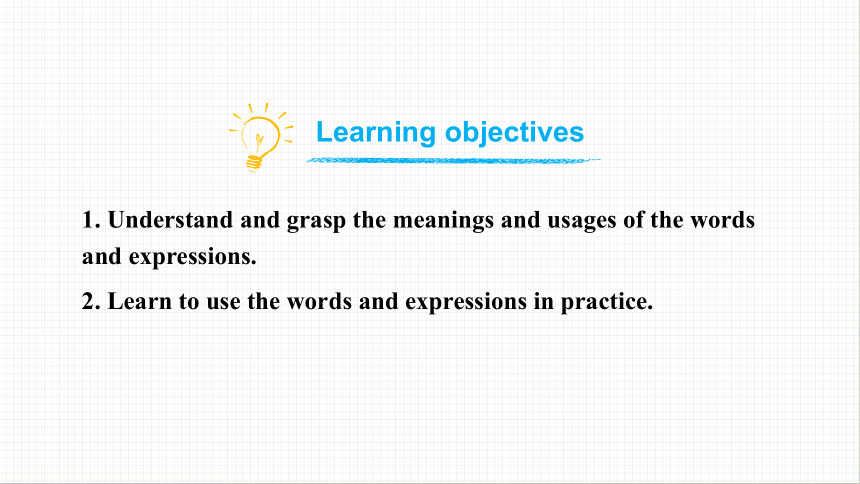

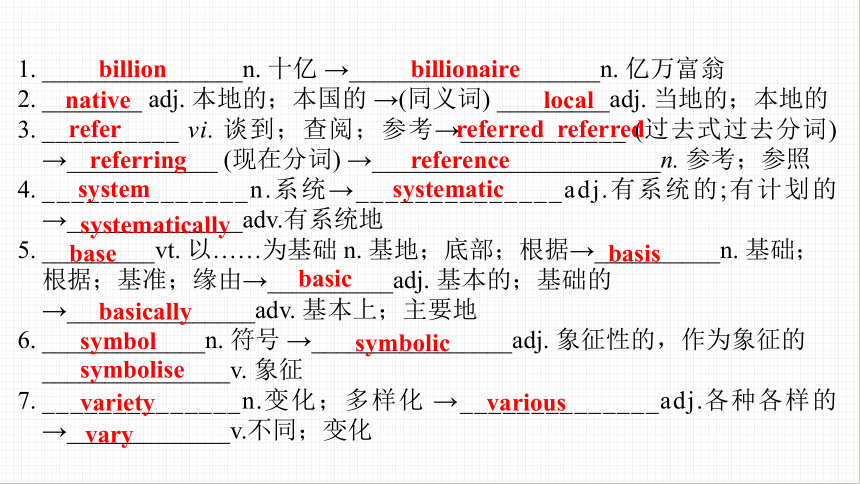
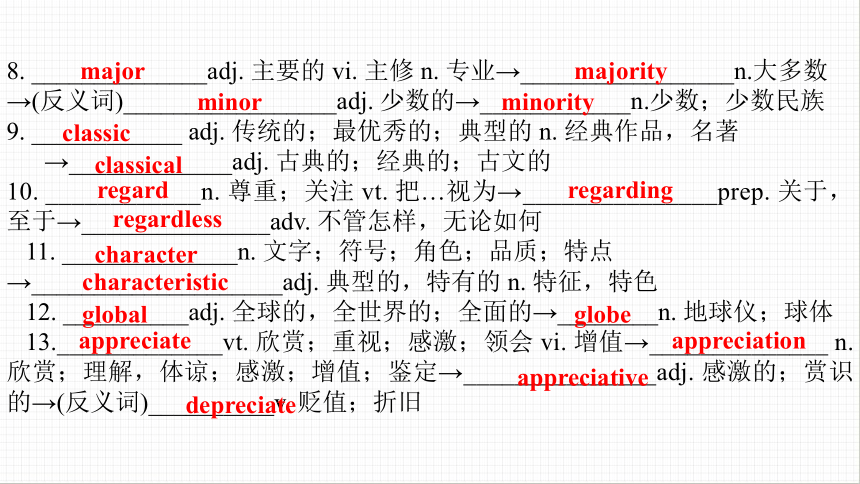
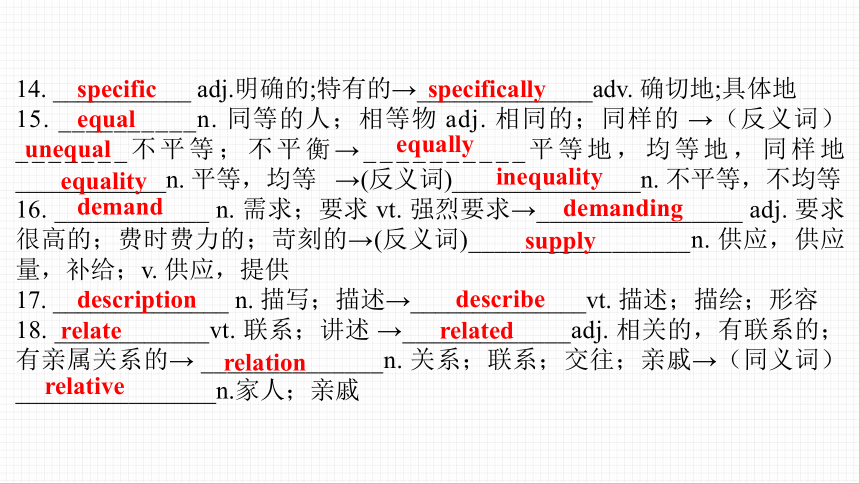

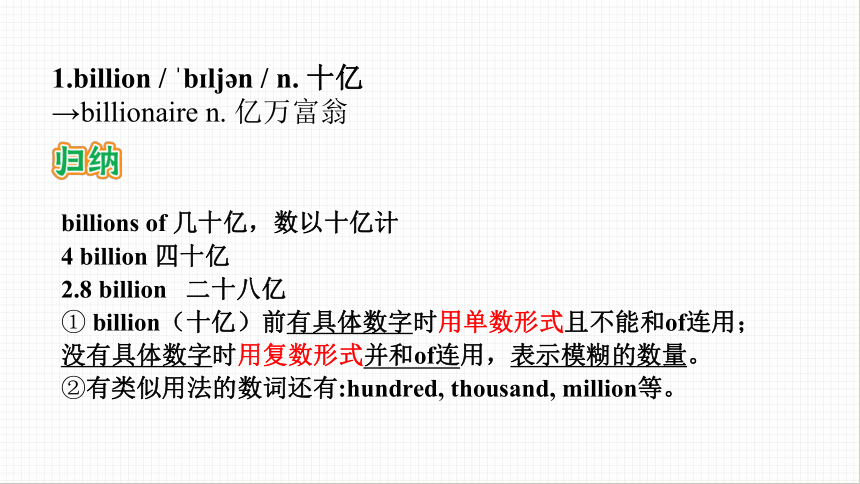
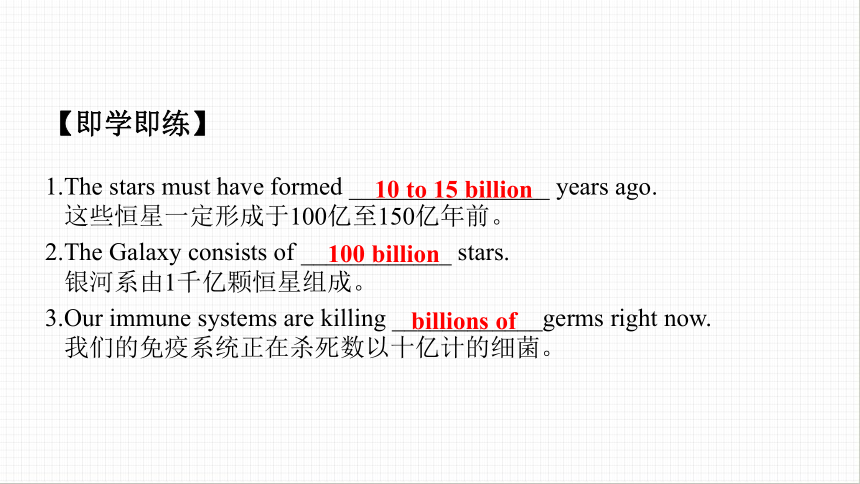
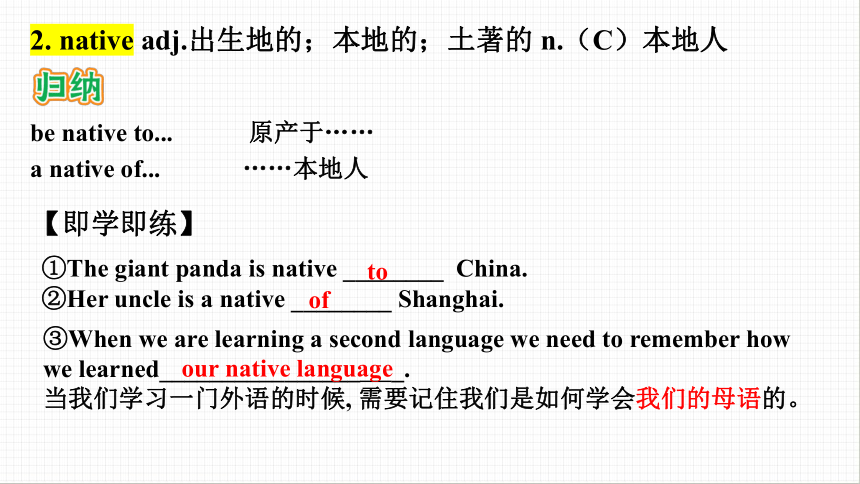
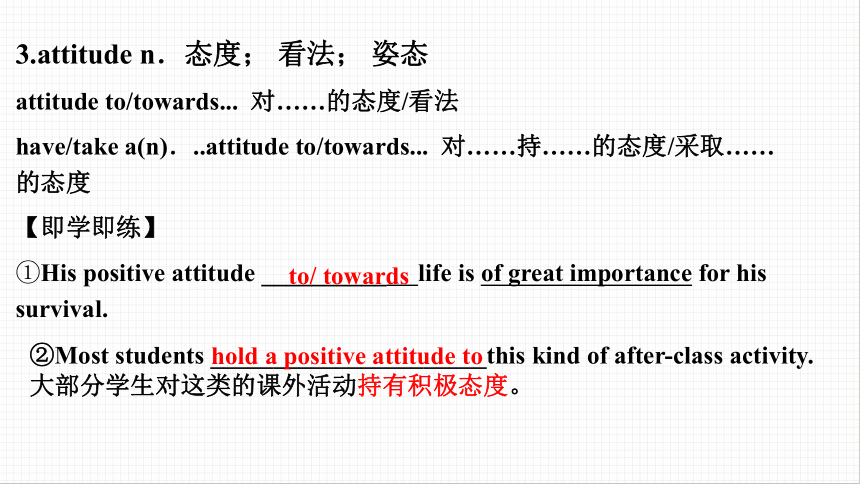
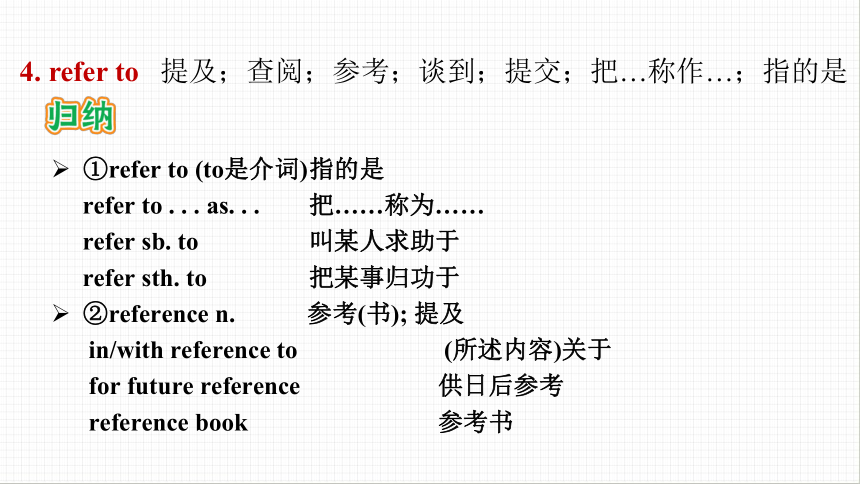
文档简介
(共58张PPT)
Language points
Unit 5 Languages Around The World
1. Understand and grasp the meanings and usages of the words and expressions.
2. Learn to use the words and expressions in practice.
Learning objectives
词 形 变 化
________________n. 十亿 →____________________n. 亿万富翁
________ adj. 本地的;本国的 →(同义词) _________adj. 当地的;本地的
__________ vi. 谈到;查阅;参考→____________ (过去式过去分词) →____________ (现在分词) →_______________________n. 参考;参照
______________n.系统→______________adj.有系统的;有计划的→______________adv.有系统地
_________vt. 以……为基础 n. 基地;底部;根据→__________n. 基础;根据;基准;缘由→__________adj. 基本的;基础的→_______________adv. 基本上;主要地
_____________n. 符号 →________________adj. 象征性的,作为象征的_______________v. 象征
______________n.变化;多样化 →______________adj.各种各样的→_____________v.不同;变化
billion
billionaire
native
local
refer
referred referred
referring
reference
system
systematic
systematically
base
basis
basic
basically
symbol
symbolic
symbolise
variety
various
vary
8. ______________adj. 主要的 vi. 主修 n. 专业→_________________n.大多数→(反义词)_________________adj. 少数的→____________n.少数;少数民族
9. ____________ adj. 传统的;最优秀的;典型的 n. 经典作品,名著
→_____________adj. 古典的;经典的;古文的
10. ____________n. 尊重;关注 vt. 把…视为→_______________prep. 关于,至于→_______________adv. 不管怎样,无论如何
11. ______________n. 文字;符号;角色;品质;特点 →____________________adj. 典型的,特有的 n. 特征,特色
12. __________adj. 全球的,全世界的;全面的→________n. 地球仪;球体
13._____________vt. 欣赏;重视;感激;领会 vi. 增值→______________ n. 欣赏;理解,体谅;感激;增值;鉴定→_______________adj. 感激的;赏识的→(反义词)__________v. 贬值;折旧
major
majority
minor
minority
classic
classical
regard
regarding
regardless
character
characteristic
global
globe
appreciate
appreciation
appreciative
depreciate
14. ___________ adj.明确的;特有的→______________adv. 确切地;具体地
15. __________n. 同等的人;相等物 adj. 相同的;同样的 →(反义词)_______不平等;不平衡→__________平等地,均等地,同样地____________n. 平等,均等 →(反义词)_______________n. 不平等,不均等
16. ____________ n. 需求;要求 vt. 强烈要求→________________ adj. 要求很高的;费时费力的;苛刻的→(反义词)_________________n. 供应,供应量,补给;v. 供应,提供
17. ______________ n. 描写;描述→______________vt. 描述;描绘;形容
18. ____________vt. 联系;讲述 →_____________adj. 相关的,有联系的;有亲属关系的→ ______________n. 关系;联系;交往;亲戚→(同义词)________________n.家人;亲戚
specific
specifically
equal
equality
inequality
demand
demanding
supply
description
describe
relate
related
relation
equally
unequal
relative
重点单词与短语
1.billion / b lj n / n. 十亿
→billionaire n. 亿万富翁
billions of 几十亿,数以十亿计
4 billion 四十亿
2.8 billion 二十八亿
① billion(十亿)前有具体数字时用单数形式且不能和of连用;没有具体数字时用复数形式并和of连用,表示模糊的数量。
②有类似用法的数词还有:hundred, thousand, million等。
1.The stars must have formed ________________ years ago.
这些恒星一定形成于100亿至150亿年前。
2.The Galaxy consists of ____________ stars.
银河系由1千亿颗恒星组成。
3.Our immune systems are killing ____________germs right now.
我们的免疫系统正在杀死数以十亿计的细菌。
10 to 15 billion
100 billion
billions of
【即学即练】
be native to... 原产于……
a native of... ……本地人
2. native adj.出生地的;本地的;土著的 n.(C)本地人
①The giant panda is native ________ China.
②Her uncle is a native ________ Shanghai.
to
of
【即学即练】
③When we are learning a second language we need to remember how we learned________________ _.
当我们学习一门外语的时候, 需要记住我们是如何学会我们的母语的。
our native language
3.attitude n.态度; 看法; 姿态
attitude to/towards... 对……的态度/看法
have/take a(n)...attitude to/towards... 对……持……的态度/采取……的态度
【即学即练】
①His positive attitude __________ life is of great importance for his survival.
to/ towards
②Most students ______________________this kind of after-class activity.
大部分学生对这类的课外活动持有积极态度。
hold a positive attitude to
4. refer to 提及;查阅;参考;谈到;提交;把…称作…;指的是
①refer to (to是介词) 指的是
refer to . . . as. . . 把……称为……
refer sb. to 叫某人求助于
refer sth. to 把某事归功于
②reference n. 参考(书); 提及
in/with reference to (所述内容)关于
for future reference 供日后参考
reference book 参考书
【即学即练】 语境辨义/单句语法填空
①Since the boy has been punished,please don’t refer to that matter again. ____________
②If you don’t know the meaning of the word, you can refer to the dictionary. ___________
③When I said some people were stupid I wasn’t referring to you. ____________
④They always refer to the shy teenager ______a book worm.
⑤I wrote down the name of the hotel for future _________. (refer)
提到
查阅
指的是
as
reference
完成句子
The person at the conference just now is an expert in this field.
刚才在会上提到的那个人是这个领域的专家.
referred to
【归纳】
(1)in spite of(=despite)+名词/名词性短语 即使; 尽管
in spite of/despite the fact that+句子 尽管……
(2)although/though+句子 即使; 尽管
5.despite [d spa t]
①________________the advantages of e-reading, there are also some disadvantages.
尽管电子书有优点, 也有一些缺点。
②________________that the school life is full of fun and friendship, I prefer to live in the rented room.
尽管学校生活充满了乐趣和友谊, 我更喜欢住在租的房子里。
③________________the basketball match would start soon, we still decided to send them to the hospital first.
尽管篮球赛即将开始, 我们仍然决定先把他们送到医院。
Despite/In spite of
In spite of the fact
Although/Though
【即学即练】
6. ups and downs 为名词短语, 意为:浮沉;兴衰;荣辱
Life is full of ups and downs.
生活是曲折的。
Like all marriages, they have their ups and downs.
就像所有的婚姻一样,他们也时好时坏。
类似结构:
back and forth 反复来回
(every)now and then 有时,偶尔
here and there 到处,在各处
day and night 日日夜夜,夜以继日
7. based [be st] adj.以(某事)为基础的;以……为重要部分的
base vt. 以……为据点;以……为基础 n. 底部;根据
basic adj. 基础的
basis n.基础;基本原则
(1)base...on/upon...把……建立在……基础之上
be based on/upon以……为基础;依据……
at the base of在……底部
(2)on the basis of在……基础上
on a regular basis 基于……
①One should always base his opinion ________ facts.
②They have to have a ________ (base) understanding of computers in order to use the technology.
③They found the plane ________ the base of the mountain.
④These programmes are ___________(basic)bad television programmes,but people watch them.
⑤The film is based on a true story, and it is very popular.(非谓语形式)
→__________ a true story, the film is very popular.
on
basic
at
Based on
【即学即练】
basically
8. date back (to...) 追溯(到……)
out of date 过时的;陈旧的
up to date 最新式的;现代的
to date/so far 迄今;至今;到目前为止
date back to/date from 常用于一般现在时,不用于被动语态。
常用其现在分词形式作后置定语。
【即学即练】
①The old town _____ (date) back to the late seventeenth century.
②_________ (date)back to 300 years ago,the stone house is well preserved.
③The dictionary is ______ of date: many words have been added to the language since it was published.
④I have had many books on literature __ date, but none of them are ____to date.
⑤As far as I know, they have set the date ______ the meeting.
Dating
out
to
up
for
dates
9. variety [v ra ti] n.(植物、语言等的)变体;异体;多样化
various adj. 不同的;各种各样的
vary vt.& vi. 改变;变化
a variety of=varieties of 种类繁多的
vary from... to... 从……到……不等;在……到……之间变动 vary in... 在……方面丰富多样
vary with... 随着……的变化而变化
for various reasons 由于种种原因
【即学即练】
①In my free time,I'd like to take exercise,such as swimming, running and ________ (variety) ball games.
② In the botanical garden we can find a ______(vary) of plants that range from tall trees to small flowers.
③All languages change over time and vary ________ place to place because of the local accent.
④There are (各种各样的)animals in this zoo, attracting a lot of visitors every week.
various
from
variety
a variety of/varieties of/various
10. major [ me ] adj.主要的;重要的;大的
n.主修课程;主修学生 vi.主修;专门研究
majority n. 大多数
minority 少数....
(1)major in 主修……;以……为专业
(2)the majority of 大多数……
be in the majority 构成大部分/大多数
【名师点津】
“the majority of+名词”作主语时, 谓语动词的数与of后面的名词保持一致。
【即学即练】 语境辨义
①I guessed that there was probably a major misunderstanding.____________
②Their victory in America was still remembered as a major turning point in the history of rock and roll. ____________
③The volunteer was a native of Beijing and majored in history at college ____________
④Her major is French while mine is engineering. ___________
大的
重要的
主修
主修课程
完成句子
①He inspires me to _______________in college.
他鼓励我在大学主修英语。
②______________the youths in China are positive.
中国的大部分青年人都很积极。
major in English
The majority of
11. means [mi nz] n.方式;方法;途径
mean vi. 意味着
(1)a means of communication 一种通讯/交流工具
by this means 通过这种方法
by means of... 用……办法;借助……
(2)by no means 决不,一点也不(位于句首时,句子用部分倒装)
by all means 一定,当然
(3)mean doing sth. 意味着做某事
①There is no doubt that Wechat is ___ important means of communication.
②Missing the bus means __________ (wait) for another two hours.
③我可以通过教英语来谋生。
I can make a living ____________ teaching English.
④所有可能的方法都试过了,但没有一种有效。
Every possible means _____________ (try), but none has worked.
=All possible means ______________ (try), but none has worked.
⑤处境困难时绝对不能放弃。
_____________ can you give up when you are in trouble.
an
waiting
by means of
has been tried
have been tried
By no means
【即学即练】
12. regard [r gɑ d] n.尊重;关注 vt.把……视为;看待
(1)regard/consider...as... 认为……是……
(2)have high/no regard for... 高度关注/无视……
with/in regard to sth. 关于某事
in this regard 就这一点而言
regard for… 对……的尊重
give one’s regards (to sb.) 代某人(向某人)问好
have high regard for 高度关注
regarding prep.关于,至于,就……而论
She has no regard for other people’s feelings.
The high regard for the Chinese writing system can be seen in the development of Chinese characters as an art form, known as Chinese calligraphy.
Please give my regards to your parents.
With / In regard to his suggestions, we shall discuss them fully.
She stood back and regarded him coldly.
Even to this day, Lincoln is regarded as one of the most inspiring figures in the world.
Regarding your recent inquiry, I have enclosed a copy of our new brochure.
关注
尊重
问候;致意
关于某事
注视;打量
把……看作
关于
【即学即练】
语境辨义
单句语法填空
1) Please give my __________ (regard) to your mother if you see her.
2) He has no regard ______ other people’s feeling.
3) Mountains are regarded _____ spiritual places by many cultures.
4) With regard _____ my favorite Chinese poet. I’d like to introduce
Li Bai to you.
regards
for
as
to
13. appreciate [ pri e t] vt.欣赏;重视;感激;领会 vi.增值
appreciation n.欣赏;感激
appreciate+n./pron./v. ing 重视/感激……
I would appreciate it if... 假如……,我将不胜感激
appreciation n. 欣赏;感激
express one's appreciation/thanks to sb.for sth.
因某事表达对某人的感激之情
单句语法填空
①Here I sincerely express my ___________ (appreciate) if you could help find the lost suitcase.
②I would appreciate you ______ (call) back this afternoon.
③I would appreciate __ if you would set aside the whole day on March 3 so that I
can meet with you.
完成句子
④I appreciate _____________________ to work in your company two years ago.
感激两年前给我在贵公司的工作机会。
appreciation
calling
it
being given the opportunity
【即学即练】
14. struggle [ str gl] n. & vi. 斗争;奋斗;搏斗
struggle for 努力争取……;为……而斗争
struggle against/with 与……作斗争
struggle to do sth. 努力做某事
struggle to one's feet 挣扎着站起来
【即学即练】
1) She’s struggling _________(bring) up a family alone.
2) Millions of people are struggling ________ survival.
3) John struggled ____________ cancer for two years.
4) Police said there were no signs of a _________(struggle).
to bring
for
against / with
struggle
5)Though he was badly injured,he _______________________(挣扎着站了起来).
struggled to his feet
15. point of view 观点
【典型例句】 There are a number of different points of view on this issue.
在这个问题上意见纷纭。
【归纳】
from one’s point of view 依照某人的观点; 在某人看来
come into view 在视野之中; 看得见
take /hold the view that. . . 持有……观点
in view of 鉴于; 考虑到; 由于
完成句子
From Zhong Nanshan’s ____________, _________safety, he firmly ____________that everyone should wear masks and keep distance from each other in public areas.
在钟南山看来, 考虑到安全性, 他坚定地认为每人都应佩戴口罩并在公共场合保持距离。
point of view
in view of
holds the view
【即学即练】
16. equal [ i kw l] n.同等的人;相等物 adj.相同的
unequal adj.不相等的;不平等的
equality n.平等;相等
equally adv.相等地;同等地;公平地
(1)the equal of与……相等/匹敌
be without equal=have no equal无与伦比
(2)equal sb/sth in(doing) sth在(做)某事上比得过、敌得过某人/物
(3)be equal to sth/doing sth等于/胜任(做)某事
be equal in sth在某方面平等/相同
【即学即练】
(1)China has always insisted that all countries,big or small,should be _______ (equality).
(2)Men and women must be treated _______ (equal) in education and employment.
(3)Any man will be equal_______ the task;so long as he is careful,you should give him a try.
(4)We need to be active in all kinds of sports,and pay attention to mental health which is equal _____ physical health.
(5) Fascinated by the structural beauty of the Forbidden City as a painter, she is________(equal) interested to learn more about Chinese philosophy.
(6)No one equals him ____ courage, about which every one knows.
equal
equally
to
in
equally
in
17. demand [d mɑ nd] n.要求;需求 vt.强烈要求;需要vi.查问
demanding adj. 高要求的;要求严格的
(1)demand to do sth. 要求做某事
demand of sb to do sth. 要求某人做某事
demand sth. of/from sb. 向某人要某物
demand that.../it is demanded that...(should)+动词原形 要求……
(2)be in (great) demand (迫切)需求
meet/satisfy/serve one’s demands (for sth) 满足某人(对…)的需求
①Like running, race walking is physically __________ (demand), she says.
②First, science graduates are ____ greater demand than arts ones in China.
③Yesterday evening,the couple came to my house and demanded help ________ me.
【即学即练】
demanding
in
of/from
④My father came down and demanded _______(know) what was going on.
⑤My demand is that the information referred to in my report _________________ (email) Mr Brown without delay.
to know
(should) be emailed
18. description n.描写(文字);形容
(1)beyond description 无法形容;难以描述
give a description of 对……进行描述
(2)describe vt. 描述;形容;描绘
describe sb./sth. to sb向某人描写某人/某物
单句语法填空
(1) He gave me a detailed ___________(describe)of how he managed to get the information.
(2) It was a tiny little house,but everything in it was so clean,neat and elegant that it is _________ description.
完成句子
(3) She __________________________(对……作了简短的描述) the amazing classroom.
description
beyond
gave a brief description of
【即学即练】
19. relate [r le t] vt.联系;讲述
related adj.相关的;有联系的
relation n.(人、团体、国家之间的)关系;[U,C]关联
relationship n.关系;联系
relative adj.比较的;相对的 n.亲戚
relatively adv. 相对地; 相当地
(1)relate sth.to sb. 向某人讲述
relate to 与……相关;涉及;谈到
(2)be related to 与……有关
(3)in relation to 关于
单句语法填空
(1) It is said that this festival is related ________a legend(传说).
(2) I found it difficult ________(relate)the two ideas in my mind.
(3) Old Henry suffers from memory loss ________( relate)to his disease.
(4) The study found a direct ________(relate)between smoking and lung cancer.
完成句子
(5) She ___________(向我们讲述了) some of her experiences in Africa.
(6) Theory should ____________________(与……紧密联系) practice.
to
to relate
related
relation
related to us
be closely related to
【即学即练】
重 点 句 式
教材原句p.66 I used to get high marks in English,but now I’m having a lot of trouble with my listening. 以前我的英语成绩还挺好的,但是现在我的听力有很大的麻烦。
He used to overlook the small detail like that. 他过去常忽略那样的小细节。
【误区警示】
used to 有两种否定形式和两种疑问形式:
used not to do = usedn’t to do
did not use to do = didn’t use to do
Used + 主语 + to + do...
Did + 主语 + use to + do...
否定形式:
疑问形式:
1. used to do sth. 过去常常做某事(强调现在不这样了)
【用法比较】
(1)used to do sth. 过去经常做某事(现在不做了)
( 2)be used to(doing)sth. 习惯于(做)某事(to是介词,后接名词、代词或动名词)
(3)be used to do sth. 被用来做某事(被动语态)
The old man used to watch TV after supper,but now he is used to taking a walk in the park and his stick is used to help him walk. 这位老人过去常在晚饭后看电视,但现在他习惯去公园散步,他的手杖被用来帮助他走路。
单句语法填空
(1)Wood is often used ________(make)desks and chairs.
(2) She is used to ________(live)in the countryside now.
(3) My grandparents are used _____ the life in the suburbs.
完成句子
(4) We ___________(过去常常)get information from newspapers,but now we ______________(习惯于)searching for it on the Internet.
(5) Your father used to drink a lot,____________________(是吗)
(6) ______________________(她过去常常)give lectures to teenagers
to make
living
to
used to
are used to
usedn’t he/didn’t he
Used she to/Did she use to
2 have trouble with 在某方面有困难
We’re having a lot of trouble with the new computer system.
我们的新电脑系统有许多问题。
【归纳拓展】
have trouble/difficulty(in)doing sth. 做某事有困难
have a hard/difficult time(in)doing sth. 做某事历经艰难
have no trouble/difficulty(in)doing sth. 做某事毫不费力
Do you have trouble remembering names at parties 你在聚会上记住人的名字有困难吗
If kids have a hard time keeping up academically,they may need to drop some activities.
如果孩子在学业上要度过一个困难时期,他们可能需要放弃一些活动。
We had no trouble persuading the boy.我们毫不费劲地说服了这个男孩。
【一言助记】
When in trouble,you should first get out of trouble by yourself and try not to cause trouble to others. You may feel troubled if someone takes the trouble to help you. In a word,don’t trouble trouble until trouble troubles you. 遇到麻烦时,首先要自己摆脱麻烦,尽量不给别人添麻烦。如果有人不辞劳苦帮助你,你可能会感到不自在。总之, 麻烦没有来找你时,不要去找麻烦。
单句语法填空
(1) Whenever we have trouble ________ our studies,our teachers always help us patiently.
(2)I am sorry to hear that you are having trouble __________( improve)your English at your new school.
(3) The police had much difficulty ________(find)out the connection between the man and the case.
完成句子
(4)I had trouble ______________________________( 让这个受到惊吓的男孩平静下来).
(5) I __________________________(在……有困难) pronunciation.
(6) Frank insisted that he was not asleep although I had great difficulty _____________________(把他叫醒).
with
improving
finding
calming the frightened boy down
have trouble/difficulty with
(in)waking him up
教材原句p.66 Would you mind opening the window,please
请问,您介意打开窗户吗?
【句式分析】“Would you mind... ”是常用口语句型,用来征求对方的意见或客气地提出请求。
Would you mind calling back later I’m sorry. 你介意稍后再打来吗?我很抱歉。
【学法点拨】
Would / Do you mind (my)doing sth. 你介意(我)做某事吗?
Would / Do you mind if... 如果……你介意吗?
Would you mind my using your book 你介意我用一下你的书吗?
Do you mind if I smoke 我抽烟你介意吗
3. Would you mind... 你介意……吗?
【误区警示】
Would you mind if + 一般过去时
Do you mind if + 一般现在时
Would you mind if I borrowed your dictionary 你介意把词典借给我吗?
【学法点拨】
回答“不介意”常用“No,not at all.” “Certainly not.”等;回答“介意”常用“I’d rather you didn’t.” “I’m sorry,but...”“I’m afraid...”“I think you’d better not.”等。
单句语法填空
(1) Would you mind not ________(pick)the flowers in the garden They are for everyone’s enjoyment.
(2)Would you mind if he ________(ask) some questions which may make you embarrassed
(3) Do you mind his ________(open) the window
同义句转换
(4)Would you mind my asking you a personal question
→Would you mind ________ ________ ________you a personal question
→Do you mind ________ ________ ________you a personal question
picking
asked
opening
if I asked
if I ask
4. Even today, no matter where Chinese people live or what dialect they speak, they can all still communicate in writing. 即使在今天, 不论住在哪里, 也不论说何种方言, 中国人都仍能通过书写进行交流。
【句型公式】
“no matter +疑问词” 引导的让步状语从句
“no matter+疑问词”与“疑问词+-ever”异同
“no matter+疑问词” “no matter+疑问词”结构只能引导让步状语从句, 这时可以和“疑问词+-ever”互换, 值得注意的是它不能引导名词性从句
“疑问词+-ever” wh-ever可引导让步状语从句, 也可引导名词性从句
【知识微练】 完成句子
① A determined person always tries to finish the job, __________________it is.
无论工作多么困难, 意志坚定的人总会尽力完成。
②_____________________________________my task on schedule.
无论发生什么, 我尽力按时完成任务。
③_____________________, you should let your parents know. 无论去什么地方,
你都应该让你父母知道。
no matter how hard
No matter what happened, I tried to finish
No matter where you go
5. The more I learnt of a language, the more my brain would grow.
我对一门语言学的越多, 我的大脑就会越发达。
【典型例句】 The more learned a man is, the more modest he usually becomes. 一个人越博学, 往往变得越谦虚。
【句型公式】
“the+比较级(+主语+谓语), the+比较级(+主语+谓语)”结构(……) 越……, (……)越……, 表示后者随着前者的变化而变化
(1)the+比较级. . . the+比较级. . . 句型中, 主句和从句的时态常用一般现在时或一般过去时。若主句的谓语动词用一般将来时, 从句的谓语动词要用一般现在时表示将来。
(2)在意义明确的情况下, 主从句都可以有所省略, 特别是谚语、俗语中。The more, the better. 多多益善。
【知识微练】 单句语法填空
①There are lots of ways to raise awareness for a cause. Usually, the _______ (strange) the idea is, the more it gets noticed.
②The more positive an article, the __________(likely) it was to be shared.
【佳句赏析】
The more often you seize opportunities to talk to the foreigners, the more confident you will be when speaking a foreign language.
越常抓住机会和外国人交谈, 说外语时你就越自信。
stranger
more likely
Language points
Unit 5 Languages Around The World
1. Understand and grasp the meanings and usages of the words and expressions.
2. Learn to use the words and expressions in practice.
Learning objectives
词 形 变 化
________________n. 十亿 →____________________n. 亿万富翁
________ adj. 本地的;本国的 →(同义词) _________adj. 当地的;本地的
__________ vi. 谈到;查阅;参考→____________ (过去式过去分词) →____________ (现在分词) →_______________________n. 参考;参照
______________n.系统→______________adj.有系统的;有计划的→______________adv.有系统地
_________vt. 以……为基础 n. 基地;底部;根据→__________n. 基础;根据;基准;缘由→__________adj. 基本的;基础的→_______________adv. 基本上;主要地
_____________n. 符号 →________________adj. 象征性的,作为象征的_______________v. 象征
______________n.变化;多样化 →______________adj.各种各样的→_____________v.不同;变化
billion
billionaire
native
local
refer
referred referred
referring
reference
system
systematic
systematically
base
basis
basic
basically
symbol
symbolic
symbolise
variety
various
vary
8. ______________adj. 主要的 vi. 主修 n. 专业→_________________n.大多数→(反义词)_________________adj. 少数的→____________n.少数;少数民族
9. ____________ adj. 传统的;最优秀的;典型的 n. 经典作品,名著
→_____________adj. 古典的;经典的;古文的
10. ____________n. 尊重;关注 vt. 把…视为→_______________prep. 关于,至于→_______________adv. 不管怎样,无论如何
11. ______________n. 文字;符号;角色;品质;特点 →____________________adj. 典型的,特有的 n. 特征,特色
12. __________adj. 全球的,全世界的;全面的→________n. 地球仪;球体
13._____________vt. 欣赏;重视;感激;领会 vi. 增值→______________ n. 欣赏;理解,体谅;感激;增值;鉴定→_______________adj. 感激的;赏识的→(反义词)__________v. 贬值;折旧
major
majority
minor
minority
classic
classical
regard
regarding
regardless
character
characteristic
global
globe
appreciate
appreciation
appreciative
depreciate
14. ___________ adj.明确的;特有的→______________adv. 确切地;具体地
15. __________n. 同等的人;相等物 adj. 相同的;同样的 →(反义词)_______不平等;不平衡→__________平等地,均等地,同样地____________n. 平等,均等 →(反义词)_______________n. 不平等,不均等
16. ____________ n. 需求;要求 vt. 强烈要求→________________ adj. 要求很高的;费时费力的;苛刻的→(反义词)_________________n. 供应,供应量,补给;v. 供应,提供
17. ______________ n. 描写;描述→______________vt. 描述;描绘;形容
18. ____________vt. 联系;讲述 →_____________adj. 相关的,有联系的;有亲属关系的→ ______________n. 关系;联系;交往;亲戚→(同义词)________________n.家人;亲戚
specific
specifically
equal
equality
inequality
demand
demanding
supply
description
describe
relate
related
relation
equally
unequal
relative
重点单词与短语
1.billion / b lj n / n. 十亿
→billionaire n. 亿万富翁
billions of 几十亿,数以十亿计
4 billion 四十亿
2.8 billion 二十八亿
① billion(十亿)前有具体数字时用单数形式且不能和of连用;没有具体数字时用复数形式并和of连用,表示模糊的数量。
②有类似用法的数词还有:hundred, thousand, million等。
1.The stars must have formed ________________ years ago.
这些恒星一定形成于100亿至150亿年前。
2.The Galaxy consists of ____________ stars.
银河系由1千亿颗恒星组成。
3.Our immune systems are killing ____________germs right now.
我们的免疫系统正在杀死数以十亿计的细菌。
10 to 15 billion
100 billion
billions of
【即学即练】
be native to... 原产于……
a native of... ……本地人
2. native adj.出生地的;本地的;土著的 n.(C)本地人
①The giant panda is native ________ China.
②Her uncle is a native ________ Shanghai.
to
of
【即学即练】
③When we are learning a second language we need to remember how we learned________________ _.
当我们学习一门外语的时候, 需要记住我们是如何学会我们的母语的。
our native language
3.attitude n.态度; 看法; 姿态
attitude to/towards... 对……的态度/看法
have/take a(n)...attitude to/towards... 对……持……的态度/采取……的态度
【即学即练】
①His positive attitude __________ life is of great importance for his survival.
to/ towards
②Most students ______________________this kind of after-class activity.
大部分学生对这类的课外活动持有积极态度。
hold a positive attitude to
4. refer to 提及;查阅;参考;谈到;提交;把…称作…;指的是
①refer to (to是介词) 指的是
refer to . . . as. . . 把……称为……
refer sb. to 叫某人求助于
refer sth. to 把某事归功于
②reference n. 参考(书); 提及
in/with reference to (所述内容)关于
for future reference 供日后参考
reference book 参考书
【即学即练】 语境辨义/单句语法填空
①Since the boy has been punished,please don’t refer to that matter again. ____________
②If you don’t know the meaning of the word, you can refer to the dictionary. ___________
③When I said some people were stupid I wasn’t referring to you. ____________
④They always refer to the shy teenager ______a book worm.
⑤I wrote down the name of the hotel for future _________. (refer)
提到
查阅
指的是
as
reference
完成句子
The person at the conference just now is an expert in this field.
刚才在会上提到的那个人是这个领域的专家.
referred to
【归纳】
(1)in spite of(=despite)+名词/名词性短语 即使; 尽管
in spite of/despite the fact that+句子 尽管……
(2)although/though+句子 即使; 尽管
5.despite [d spa t]
①________________the advantages of e-reading, there are also some disadvantages.
尽管电子书有优点, 也有一些缺点。
②________________that the school life is full of fun and friendship, I prefer to live in the rented room.
尽管学校生活充满了乐趣和友谊, 我更喜欢住在租的房子里。
③________________the basketball match would start soon, we still decided to send them to the hospital first.
尽管篮球赛即将开始, 我们仍然决定先把他们送到医院。
Despite/In spite of
In spite of the fact
Although/Though
【即学即练】
6. ups and downs 为名词短语, 意为:浮沉;兴衰;荣辱
Life is full of ups and downs.
生活是曲折的。
Like all marriages, they have their ups and downs.
就像所有的婚姻一样,他们也时好时坏。
类似结构:
back and forth 反复来回
(every)now and then 有时,偶尔
here and there 到处,在各处
day and night 日日夜夜,夜以继日
7. based [be st] adj.以(某事)为基础的;以……为重要部分的
base vt. 以……为据点;以……为基础 n. 底部;根据
basic adj. 基础的
basis n.基础;基本原则
(1)base...on/upon...把……建立在……基础之上
be based on/upon以……为基础;依据……
at the base of在……底部
(2)on the basis of在……基础上
on a regular basis 基于……
①One should always base his opinion ________ facts.
②They have to have a ________ (base) understanding of computers in order to use the technology.
③They found the plane ________ the base of the mountain.
④These programmes are ___________(basic)bad television programmes,but people watch them.
⑤The film is based on a true story, and it is very popular.(非谓语形式)
→__________ a true story, the film is very popular.
on
basic
at
Based on
【即学即练】
basically
8. date back (to...) 追溯(到……)
out of date 过时的;陈旧的
up to date 最新式的;现代的
to date/so far 迄今;至今;到目前为止
date back to/date from 常用于一般现在时,不用于被动语态。
常用其现在分词形式作后置定语。
【即学即练】
①The old town _____ (date) back to the late seventeenth century.
②_________ (date)back to 300 years ago,the stone house is well preserved.
③The dictionary is ______ of date: many words have been added to the language since it was published.
④I have had many books on literature __ date, but none of them are ____to date.
⑤As far as I know, they have set the date ______ the meeting.
Dating
out
to
up
for
dates
9. variety [v ra ti] n.(植物、语言等的)变体;异体;多样化
various adj. 不同的;各种各样的
vary vt.& vi. 改变;变化
a variety of=varieties of 种类繁多的
vary from... to... 从……到……不等;在……到……之间变动 vary in... 在……方面丰富多样
vary with... 随着……的变化而变化
for various reasons 由于种种原因
【即学即练】
①In my free time,I'd like to take exercise,such as swimming, running and ________ (variety) ball games.
② In the botanical garden we can find a ______(vary) of plants that range from tall trees to small flowers.
③All languages change over time and vary ________ place to place because of the local accent.
④There are (各种各样的)animals in this zoo, attracting a lot of visitors every week.
various
from
variety
a variety of/varieties of/various
10. major [ me ] adj.主要的;重要的;大的
n.主修课程;主修学生 vi.主修;专门研究
majority n. 大多数
minority 少数....
(1)major in 主修……;以……为专业
(2)the majority of 大多数……
be in the majority 构成大部分/大多数
【名师点津】
“the majority of+名词”作主语时, 谓语动词的数与of后面的名词保持一致。
【即学即练】 语境辨义
①I guessed that there was probably a major misunderstanding.____________
②Their victory in America was still remembered as a major turning point in the history of rock and roll. ____________
③The volunteer was a native of Beijing and majored in history at college ____________
④Her major is French while mine is engineering. ___________
大的
重要的
主修
主修课程
完成句子
①He inspires me to _______________in college.
他鼓励我在大学主修英语。
②______________the youths in China are positive.
中国的大部分青年人都很积极。
major in English
The majority of
11. means [mi nz] n.方式;方法;途径
mean vi. 意味着
(1)a means of communication 一种通讯/交流工具
by this means 通过这种方法
by means of... 用……办法;借助……
(2)by no means 决不,一点也不(位于句首时,句子用部分倒装)
by all means 一定,当然
(3)mean doing sth. 意味着做某事
①There is no doubt that Wechat is ___ important means of communication.
②Missing the bus means __________ (wait) for another two hours.
③我可以通过教英语来谋生。
I can make a living ____________ teaching English.
④所有可能的方法都试过了,但没有一种有效。
Every possible means _____________ (try), but none has worked.
=All possible means ______________ (try), but none has worked.
⑤处境困难时绝对不能放弃。
_____________ can you give up when you are in trouble.
an
waiting
by means of
has been tried
have been tried
By no means
【即学即练】
12. regard [r gɑ d] n.尊重;关注 vt.把……视为;看待
(1)regard/consider...as... 认为……是……
(2)have high/no regard for... 高度关注/无视……
with/in regard to sth. 关于某事
in this regard 就这一点而言
regard for… 对……的尊重
give one’s regards (to sb.) 代某人(向某人)问好
have high regard for 高度关注
regarding prep.关于,至于,就……而论
She has no regard for other people’s feelings.
The high regard for the Chinese writing system can be seen in the development of Chinese characters as an art form, known as Chinese calligraphy.
Please give my regards to your parents.
With / In regard to his suggestions, we shall discuss them fully.
She stood back and regarded him coldly.
Even to this day, Lincoln is regarded as one of the most inspiring figures in the world.
Regarding your recent inquiry, I have enclosed a copy of our new brochure.
关注
尊重
问候;致意
关于某事
注视;打量
把……看作
关于
【即学即练】
语境辨义
单句语法填空
1) Please give my __________ (regard) to your mother if you see her.
2) He has no regard ______ other people’s feeling.
3) Mountains are regarded _____ spiritual places by many cultures.
4) With regard _____ my favorite Chinese poet. I’d like to introduce
Li Bai to you.
regards
for
as
to
13. appreciate [ pri e t] vt.欣赏;重视;感激;领会 vi.增值
appreciation n.欣赏;感激
appreciate+n./pron./v. ing 重视/感激……
I would appreciate it if... 假如……,我将不胜感激
appreciation n. 欣赏;感激
express one's appreciation/thanks to sb.for sth.
因某事表达对某人的感激之情
单句语法填空
①Here I sincerely express my ___________ (appreciate) if you could help find the lost suitcase.
②I would appreciate you ______ (call) back this afternoon.
③I would appreciate __ if you would set aside the whole day on March 3 so that I
can meet with you.
完成句子
④I appreciate _____________________ to work in your company two years ago.
感激两年前给我在贵公司的工作机会。
appreciation
calling
it
being given the opportunity
【即学即练】
14. struggle [ str gl] n. & vi. 斗争;奋斗;搏斗
struggle for 努力争取……;为……而斗争
struggle against/with 与……作斗争
struggle to do sth. 努力做某事
struggle to one's feet 挣扎着站起来
【即学即练】
1) She’s struggling _________(bring) up a family alone.
2) Millions of people are struggling ________ survival.
3) John struggled ____________ cancer for two years.
4) Police said there were no signs of a _________(struggle).
to bring
for
against / with
struggle
5)Though he was badly injured,he _______________________(挣扎着站了起来).
struggled to his feet
15. point of view 观点
【典型例句】 There are a number of different points of view on this issue.
在这个问题上意见纷纭。
【归纳】
from one’s point of view 依照某人的观点; 在某人看来
come into view 在视野之中; 看得见
take /hold the view that. . . 持有……观点
in view of 鉴于; 考虑到; 由于
完成句子
From Zhong Nanshan’s ____________, _________safety, he firmly ____________that everyone should wear masks and keep distance from each other in public areas.
在钟南山看来, 考虑到安全性, 他坚定地认为每人都应佩戴口罩并在公共场合保持距离。
point of view
in view of
holds the view
【即学即练】
16. equal [ i kw l] n.同等的人;相等物 adj.相同的
unequal adj.不相等的;不平等的
equality n.平等;相等
equally adv.相等地;同等地;公平地
(1)the equal of与……相等/匹敌
be without equal=have no equal无与伦比
(2)equal sb/sth in(doing) sth在(做)某事上比得过、敌得过某人/物
(3)be equal to sth/doing sth等于/胜任(做)某事
be equal in sth在某方面平等/相同
【即学即练】
(1)China has always insisted that all countries,big or small,should be _______ (equality).
(2)Men and women must be treated _______ (equal) in education and employment.
(3)Any man will be equal_______ the task;so long as he is careful,you should give him a try.
(4)We need to be active in all kinds of sports,and pay attention to mental health which is equal _____ physical health.
(5) Fascinated by the structural beauty of the Forbidden City as a painter, she is________(equal) interested to learn more about Chinese philosophy.
(6)No one equals him ____ courage, about which every one knows.
equal
equally
to
in
equally
in
17. demand [d mɑ nd] n.要求;需求 vt.强烈要求;需要vi.查问
demanding adj. 高要求的;要求严格的
(1)demand to do sth. 要求做某事
demand of sb to do sth. 要求某人做某事
demand sth. of/from sb. 向某人要某物
demand that.../it is demanded that...(should)+动词原形 要求……
(2)be in (great) demand (迫切)需求
meet/satisfy/serve one’s demands (for sth) 满足某人(对…)的需求
①Like running, race walking is physically __________ (demand), she says.
②First, science graduates are ____ greater demand than arts ones in China.
③Yesterday evening,the couple came to my house and demanded help ________ me.
【即学即练】
demanding
in
of/from
④My father came down and demanded _______(know) what was going on.
⑤My demand is that the information referred to in my report _________________ (email) Mr Brown without delay.
to know
(should) be emailed
18. description n.描写(文字);形容
(1)beyond description 无法形容;难以描述
give a description of 对……进行描述
(2)describe vt. 描述;形容;描绘
describe sb./sth. to sb向某人描写某人/某物
单句语法填空
(1) He gave me a detailed ___________(describe)of how he managed to get the information.
(2) It was a tiny little house,but everything in it was so clean,neat and elegant that it is _________ description.
完成句子
(3) She __________________________(对……作了简短的描述) the amazing classroom.
description
beyond
gave a brief description of
【即学即练】
19. relate [r le t] vt.联系;讲述
related adj.相关的;有联系的
relation n.(人、团体、国家之间的)关系;[U,C]关联
relationship n.关系;联系
relative adj.比较的;相对的 n.亲戚
relatively adv. 相对地; 相当地
(1)relate sth.to sb. 向某人讲述
relate to 与……相关;涉及;谈到
(2)be related to 与……有关
(3)in relation to 关于
单句语法填空
(1) It is said that this festival is related ________a legend(传说).
(2) I found it difficult ________(relate)the two ideas in my mind.
(3) Old Henry suffers from memory loss ________( relate)to his disease.
(4) The study found a direct ________(relate)between smoking and lung cancer.
完成句子
(5) She ___________(向我们讲述了) some of her experiences in Africa.
(6) Theory should ____________________(与……紧密联系) practice.
to
to relate
related
relation
related to us
be closely related to
【即学即练】
重 点 句 式
教材原句p.66 I used to get high marks in English,but now I’m having a lot of trouble with my listening. 以前我的英语成绩还挺好的,但是现在我的听力有很大的麻烦。
He used to overlook the small detail like that. 他过去常忽略那样的小细节。
【误区警示】
used to 有两种否定形式和两种疑问形式:
used not to do = usedn’t to do
did not use to do = didn’t use to do
Used + 主语 + to + do...
Did + 主语 + use to + do...
否定形式:
疑问形式:
1. used to do sth. 过去常常做某事(强调现在不这样了)
【用法比较】
(1)used to do sth. 过去经常做某事(现在不做了)
( 2)be used to(doing)sth. 习惯于(做)某事(to是介词,后接名词、代词或动名词)
(3)be used to do sth. 被用来做某事(被动语态)
The old man used to watch TV after supper,but now he is used to taking a walk in the park and his stick is used to help him walk. 这位老人过去常在晚饭后看电视,但现在他习惯去公园散步,他的手杖被用来帮助他走路。
单句语法填空
(1)Wood is often used ________(make)desks and chairs.
(2) She is used to ________(live)in the countryside now.
(3) My grandparents are used _____ the life in the suburbs.
完成句子
(4) We ___________(过去常常)get information from newspapers,but now we ______________(习惯于)searching for it on the Internet.
(5) Your father used to drink a lot,____________________(是吗)
(6) ______________________(她过去常常)give lectures to teenagers
to make
living
to
used to
are used to
usedn’t he/didn’t he
Used she to/Did she use to
2 have trouble with 在某方面有困难
We’re having a lot of trouble with the new computer system.
我们的新电脑系统有许多问题。
【归纳拓展】
have trouble/difficulty(in)doing sth. 做某事有困难
have a hard/difficult time(in)doing sth. 做某事历经艰难
have no trouble/difficulty(in)doing sth. 做某事毫不费力
Do you have trouble remembering names at parties 你在聚会上记住人的名字有困难吗
If kids have a hard time keeping up academically,they may need to drop some activities.
如果孩子在学业上要度过一个困难时期,他们可能需要放弃一些活动。
We had no trouble persuading the boy.我们毫不费劲地说服了这个男孩。
【一言助记】
When in trouble,you should first get out of trouble by yourself and try not to cause trouble to others. You may feel troubled if someone takes the trouble to help you. In a word,don’t trouble trouble until trouble troubles you. 遇到麻烦时,首先要自己摆脱麻烦,尽量不给别人添麻烦。如果有人不辞劳苦帮助你,你可能会感到不自在。总之, 麻烦没有来找你时,不要去找麻烦。
单句语法填空
(1) Whenever we have trouble ________ our studies,our teachers always help us patiently.
(2)I am sorry to hear that you are having trouble __________( improve)your English at your new school.
(3) The police had much difficulty ________(find)out the connection between the man and the case.
完成句子
(4)I had trouble ______________________________( 让这个受到惊吓的男孩平静下来).
(5) I __________________________(在……有困难) pronunciation.
(6) Frank insisted that he was not asleep although I had great difficulty _____________________(把他叫醒).
with
improving
finding
calming the frightened boy down
have trouble/difficulty with
(in)waking him up
教材原句p.66 Would you mind opening the window,please
请问,您介意打开窗户吗?
【句式分析】“Would you mind... ”是常用口语句型,用来征求对方的意见或客气地提出请求。
Would you mind calling back later I’m sorry. 你介意稍后再打来吗?我很抱歉。
【学法点拨】
Would / Do you mind (my)doing sth. 你介意(我)做某事吗?
Would / Do you mind if... 如果……你介意吗?
Would you mind my using your book 你介意我用一下你的书吗?
Do you mind if I smoke 我抽烟你介意吗
3. Would you mind... 你介意……吗?
【误区警示】
Would you mind if + 一般过去时
Do you mind if + 一般现在时
Would you mind if I borrowed your dictionary 你介意把词典借给我吗?
【学法点拨】
回答“不介意”常用“No,not at all.” “Certainly not.”等;回答“介意”常用“I’d rather you didn’t.” “I’m sorry,but...”“I’m afraid...”“I think you’d better not.”等。
单句语法填空
(1) Would you mind not ________(pick)the flowers in the garden They are for everyone’s enjoyment.
(2)Would you mind if he ________(ask) some questions which may make you embarrassed
(3) Do you mind his ________(open) the window
同义句转换
(4)Would you mind my asking you a personal question
→Would you mind ________ ________ ________you a personal question
→Do you mind ________ ________ ________you a personal question
picking
asked
opening
if I asked
if I ask
4. Even today, no matter where Chinese people live or what dialect they speak, they can all still communicate in writing. 即使在今天, 不论住在哪里, 也不论说何种方言, 中国人都仍能通过书写进行交流。
【句型公式】
“no matter +疑问词” 引导的让步状语从句
“no matter+疑问词”与“疑问词+-ever”异同
“no matter+疑问词” “no matter+疑问词”结构只能引导让步状语从句, 这时可以和“疑问词+-ever”互换, 值得注意的是它不能引导名词性从句
“疑问词+-ever” wh-ever可引导让步状语从句, 也可引导名词性从句
【知识微练】 完成句子
① A determined person always tries to finish the job, __________________it is.
无论工作多么困难, 意志坚定的人总会尽力完成。
②_____________________________________my task on schedule.
无论发生什么, 我尽力按时完成任务。
③_____________________, you should let your parents know. 无论去什么地方,
你都应该让你父母知道。
no matter how hard
No matter what happened, I tried to finish
No matter where you go
5. The more I learnt of a language, the more my brain would grow.
我对一门语言学的越多, 我的大脑就会越发达。
【典型例句】 The more learned a man is, the more modest he usually becomes. 一个人越博学, 往往变得越谦虚。
【句型公式】
“the+比较级(+主语+谓语), the+比较级(+主语+谓语)”结构(……) 越……, (……)越……, 表示后者随着前者的变化而变化
(1)the+比较级. . . the+比较级. . . 句型中, 主句和从句的时态常用一般现在时或一般过去时。若主句的谓语动词用一般将来时, 从句的谓语动词要用一般现在时表示将来。
(2)在意义明确的情况下, 主从句都可以有所省略, 特别是谚语、俗语中。The more, the better. 多多益善。
【知识微练】 单句语法填空
①There are lots of ways to raise awareness for a cause. Usually, the _______ (strange) the idea is, the more it gets noticed.
②The more positive an article, the __________(likely) it was to be shared.
【佳句赏析】
The more often you seize opportunities to talk to the foreigners, the more confident you will be when speaking a foreign language.
越常抓住机会和外国人交谈, 说外语时你就越自信。
stranger
more likely
